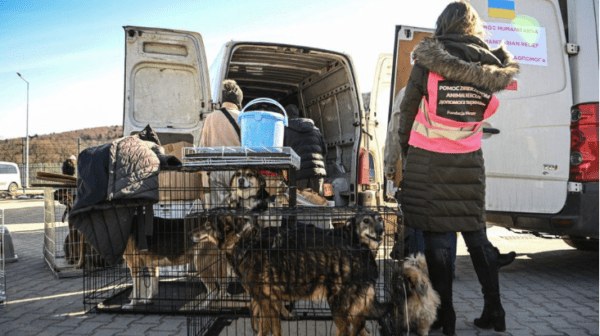“We must live up to the exemplary bravery and resilience of the Ukrainian people.”
Werner Hoyer, President of the European Investment Bank
Two years.
761 days.
18,144 hours.
Since the rumbling of the Russian invasion of Ukraine, there has been an outpouring of fear, terror, and horror. Often, amidst upheavals, animals are forgotten, though they endure the same hardships as humans.
Nevertheless, PETA-supported teams and Ukrainian animal rescues continue tirelessly to advocate for and protect animals in Ukraine. PETA Germany and their partner organization, Animal Rescue Kharkiv (ARK), have rescued 15,000 animals from conflict zones in Ukraine since the start of the war. In addition to cats and dogs, the project also includes geese, ducks, pigeons, horses, goats, sheep, cows, and horses – but there are also snakes, tortoises, swans, deer, foxes, and many more animals that need saving.* According to their mission statement, they save the hopeless and those who have no one to take care of them.
This war has caused pain to all. Animals have died and been abandoned. Some animals have been unwillingly left behind in evacuations. Others have been given up as they could not be evacuated and taken outside the country. The plight of Ukrainian animals is dire. They now find themselves solitary, famished, and ailing, often bearing severe injuries from rocket assaults. Thankfully, they have not been forgotten by ARK and PETA Germany, says Sylvie Bunz, Project Manager of PETA Helps Ukraine and Senior at PETA Germany.
By February 2024, they had helped deliver almost 1,500,000 kg of pet food to Ukraine, which is approximately the weight of eight jumbo jets. To achieve this, suppliers collectively covered a distance of 250,000 kilometers, akin to circling the globe more than 6 times. Additionally, PETA-Germany and the ARK operate an animal shelter and vet clinic that rescues and takes care of over a thousand animals. The shelter is located in Kharkiv, where a major military engagement took place in 2022. The city has been on the frontline since the start and is still subject to constant attacks.
Every day, to save as many animals as possible, ARK teams work with the Ukrainian military and the White Angels, civilian evacuation police squads. At times, there might only be a brief window of 10 to 15 minutes to collect the animals, before bombs or gunfire begin falling upon them. Generally, citizens are the ones who call in for rescues via the ARK hotline, available for all in the Kharkiv region and separately also in the Donbas region; civilians ask for the evacuation of their pets, others’ pets they have been looking after, or animals they have found or noticed in the street.
Ms. Bunz says every rescue operation is very dangerous and is always carried out together with the Ukrainian military, as the rescues often take place in restricted areas. “You can almost always hear the fighting on the front line in the background. Everything about it is challenging – the timing of the actions, the situation at the front, the information that is known about armored attacks, broken roads, destroyed houses – which are very dangerous.” Furthermore, the animals are typically highly frightened and agitated, resulting in aggression, as they are unaware that we are here to offer assistance. Ms. Bunz then said that in situations where animals are too uncooperative or where there is limited time, rescuers also use blowpipes with anesthetics.
The team must synchronize seamlessly, act swiftly, foster mutual trust, and execute every task according to the plan. Typically, the team consists of three to four people. They go out to the addresses of the caller and try to meet the caller to find the location of the animal, catch it, and place it in a cage for transport. However, rescues are not limited to those the team hears of via the hotline. In one of their YouTube videos that show them rescuing animals, a team was driving along a street when they noticed a cat walking on top of the ruins of a fence. They stopped and got the cat before continuing to gather dogs that the Ukrainian armed forces were looking after near the front.

Igor Sobko, deputy head of the ARK, interviewed with PETA Germany to talk about what life is like in the midst of the war and he stated that ARK can receive up to 90 calls a day. Upon rescuing the animals, the team takes them to a vet clinic to assess their health and rehabilitate them if needed. Mr. Sobko said that their priority there is to help the animals recover and find new loving homes or search for their original guardians who were separated from them due to the tumultuous war. So far, ARK has successfully reunited 60% of all rescued and recovered animals with their original families.
One of the most touching experiences that Mr. Sobko had during a rescue was during a mission in Bakhmut. He and his team were trying to evacuate a dog, but the dog was reluctant to go with them. Instead, he seemed to want them to follow him elsewhere. The dog led them to the ruins of a shelled-out house to another dog who was too weak to walk. They were able to rescue the two dogs together, and accordingly have been inseparable since!
In the midst of chaos and devastation, the tireless dedication of ARK and the jobs they do shines as a beacon of hope. “Animals don’t wage wars, but they’re victims of them, left to suffer without food, water, or veterinary attention for grievous injuries unless someone who cares comes to their aid,” says PETA President Ingrid Newkirk. For Sobko and his team, every saved life means the world to them. Every gentle wag of a tail or soft purr provides sufficient motivation for these brave teams to persist and keep going. Despite the challenges that are daily faced, the unwavering commitment to saving every precious life is inspiring. As the conflict rages on, let us remember the courage and compassion that continue to unite us all, reminding us that even in the darkest of times, love and empathy can prevail.
Click here to donate to PETA to help support more animals in need!
*Email Interview with Sylvie Bunz, PETA Senior Associate.







